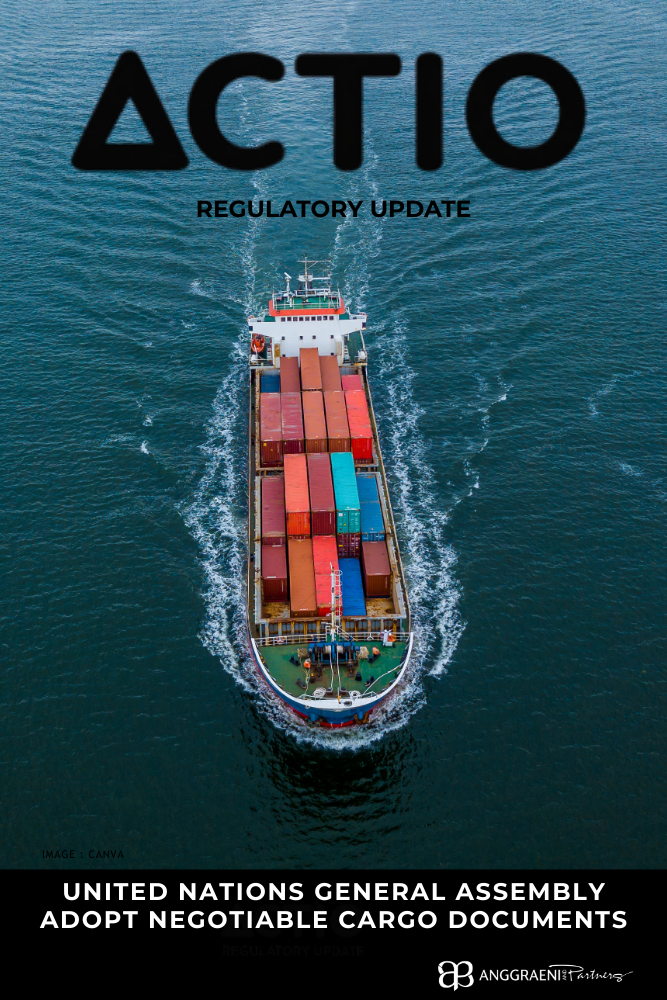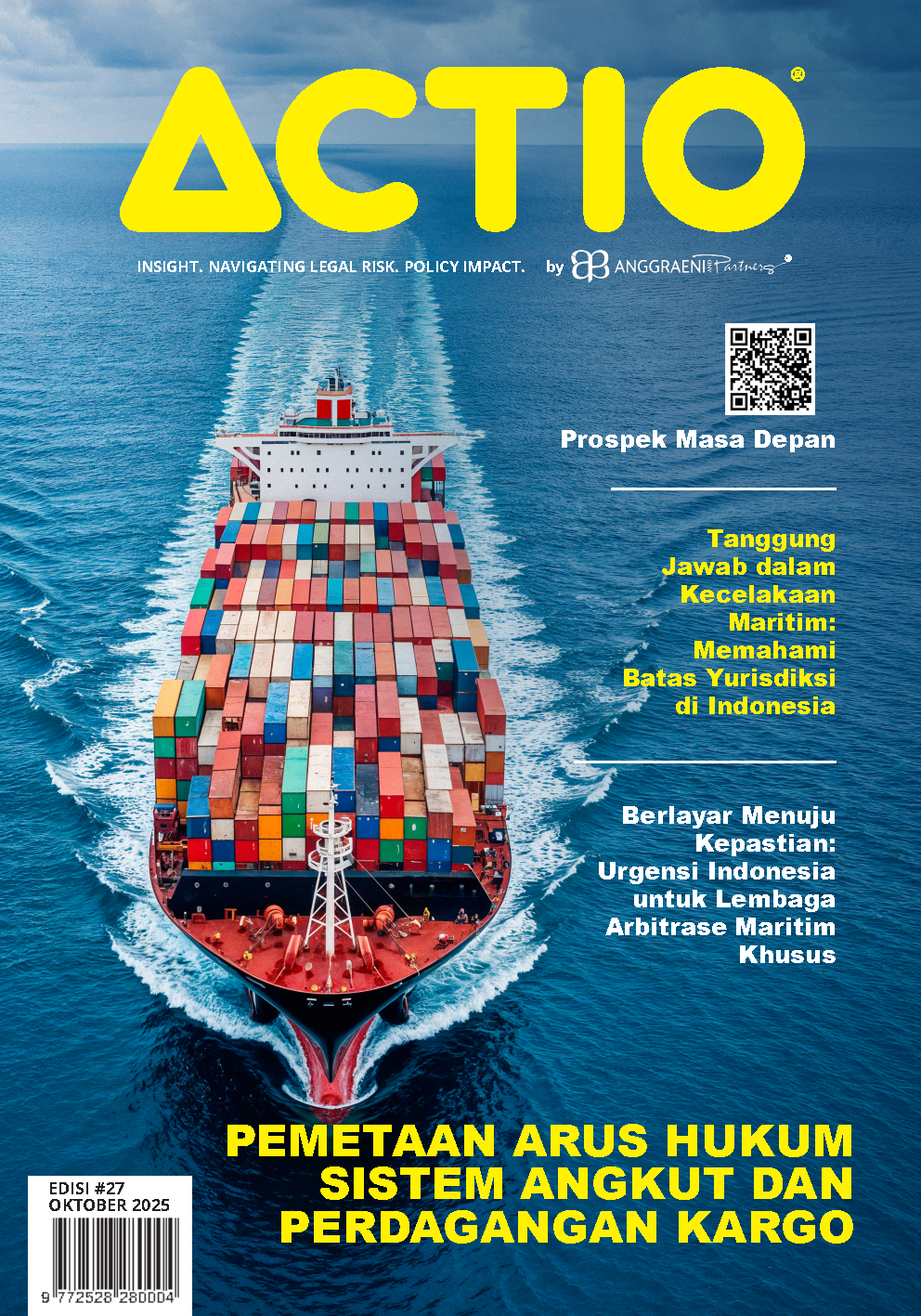The Implications of the Arbitration Provisions in the Latest Draft of the Private International Law Bill Towards the Jurisdiction of Arbitral Tribunals
By: Setyawati Fitrianggraeni, Eva F. Fauziah, Irvena A. Dewanto[1]
In March 2023, the latest draft of the Private International Law Bill (“PIL Bill”) was published. The draft contains several arbitration provisions worth examining due to their consequential implications for the competence of arbitral tribunals and legal certainty for disputing parties. According to Art. 60 of the PIL Bill, Indonesian courts may refuse to adjudicate PIL cases based on several considerations, among others, the parties to the case have legally bound themselves to an arbitration agreement or other means of dispute resolution outside the court.[2] It, however, comes with some waivers. The courts may adjudicate a PIL case although the parties have bound themselves in an arbitration agreement in the event that:[3]
- the defendant continues the dispute resolution process directly on the subject matter without expressing objection to the jurisdiction of the Indonesian Court as stated in a written document that can be proposed later;
- The Indonesian court determines that the arbitration agreement or other dispute resolution outside the court is null and void or unenforceable for valid reasons based on Indonesian laws and regulations; or
- an arbitration forum or other dispute resolution outside the court cannot be established because the defendant party has not carried out or fulfilled its promise to establish an arbitration forum or dispute resolution as agreed.
The latest provisions of the PIL Bill possess a number of implications towards the principles of consent, competence-competence, and court’s assistance in arbitration as follows:
1. Consent of the Parties
The provision of Art. 61 letter (a) of the Updated PIL Bill implies that the parties to the dispute are considered to have consented to settle their dispute in the District Court although they are bound by arbitration agreement if the defendant does not object to the Court’s jurisdiction as shown by written evidence. This is a plausible approach given the nature of arbitration as a creature of contract, meaning that the conduct of arbitration rests on the consent of the parties to the agreement.[4] Furthermore, Art. 1338 of the Indonesian Civil Code (ICC) stipulates that “All agreements made in accordance with the law apply as law to those who make them. The agreement is irrevocable other than by agreement of both parties or for reasons prescribed by law, the agreement must be executed in good faith.”[5]
This approach may pose uncertainty considering that a disputing party may try to initiate litigation rather than the agreed arbitration pursuant to this provision. To confirm the jurisdiction of the arbitrators, would require the defendant’s objection to the Court’s jurisdiction. On the other hand, it also gives the defendant an opportunity to change their mind to convert their consent to the Court’s jurisdiction if considered more beneficial in resolving the dispute.
2. Competence-competence principle
An arbitral tribunal has the authority to determine its own jurisdiction. An arbitral tribunal will proceed to settle a dispute once they have decided that they possess jurisdiction.[6] Conversely, if an arbitral tribunal finds that it lacks jurisdiction, it shall refuse to examine such dispute.[7]
The principle of competence-competence was introduced to prevent the potential clash of jurisdiction between arbitral tribunals and courts.[8] Serving as the conceptual cornerstone of international arbitration law,[9] the competence-competence principle enables arbitral tribunals to determine their own jurisdiction.[10] Thus, arbitrators are not required to obtain authorization from the Court before settling a dispute.[11]
The latest provisions of the PIL Bill imply that the Court may possess jurisdiction to settle a dispute albeit the existence of an arbitration agreement. It further stipulates that the Indonesian court has the authority to determine the validity of an arbitration agreement that should fall into the arbitral tribunal’s jurisdiction. It could thus be argued that the provisions undermine the inherent essence of arbitration, particularly the principle of competence-competence, the absolute authority of arbitral tribunals, and the nature of arbitration agreements as a law that applies to those who binds themselves thereto.
As a creature of consent the conduct of an arbitration rests on the consent of the parties to the agreement.[12] As stipulated by Art. 1 par. (1) of Law Number 30 of 1999 concerning Arbitration and Alternative Dispute Resolution (“Law 30/1999”), arbitration is a way of resolving a civil dispute outside the general court based on an arbitration agreement made in writing by the parties to the dispute.[13] The consensual nature of arbitration results in the applicability of the pacta sunt servanda principle as recognized in Article 1338 of ICC.[14] This provision implies that,[15] (i) the arbitration agreement is absolutely binding on the parties; (ii) if a dispute arises from the agreement, the authority to resolve and decide the dispute, “absolutely” becomes the authority of arbitration, not the District Court; and (iii) The nullity of the arbitration clause occurs only if it is expressly withdrawn by agreement of the parties.
Furthermore, the absolute authority of arbitration if an arbitration agreement exists, is further regulated in Law 30/1999. According to Art. 3 of Law 30/1999, the District Court is not authorized to adjudicate disputes of parties who have entered into an arbitration agreement.[16] Additionally, the existence of a written arbitration agreement negates the right of the parties to submit a dispute or dissent contained in their agreement to the District Court.[17]
3. Court’s Assistance
The settlement of a dispute by the district court due to the inability of the respondent to establish an arbitration forum or dispute resolution as agreed, can be deemed unsuitable. This occurs as the arbitral tribunal could opt to render a verstek decision as a feasible measure,[18] as opposed to proceeding to settle the dispute. The possibility of court assistance, instead, could become accommodative where an arbitration clause is found to be pathological in its provisions making it difficult – but not impossible to start arbitration. It would be highly befitting to optimize the function of the District Courts to assist the implementation of arbitration, as opposed to taking over the proceeding of a case. Dispute resolution through the district court as stipulated in Art. 61 letter (c) of the Updated PIL Bill, may serve as a last resort, where access to justice would be hindered if a takeover of the dispute by the District Court was not conducted.
Briefly, jurisdiction is the first and foremost issue that must be determined prior to the settlement of the dispute. The competence-competence principle serves as a cornerstone in international commercial arbitration that enables arbitral tribunals to determine their own jurisdiction. The latest draft of the PIL Bill, however, contains provisions that may undermine the inherent essence of arbitration, namely the principle of competence-competence, the absolute authority of the arbitral tribunal, and the nature of arbitration agreements as a law that applies to its parties.
Having considered the prevalence of arbitration as a preferred means of dispute resolution, and the possibility of exponential rise of disputes along with the country’s robust commercial, investment, and infrastructure developments, further analysis, and examination of the arbitration-related provisions in the latest draft of the PIL Bill are pertinent to be conducted. This occurs as such provisions may potentially undermine arbitration to provide ease in conducting dispute resolution and cause legal uncertainty toward business actors.
Bibliography
[1] [1] Setyawati Fitrianggraeni holds the position of Managing Partner at Anggraeni and Partners in Indonesia. She also serves as an Assistant Professor at the Faculty of Law, University of Indonesia, and is currently pursuing a PhD at the World Maritime University in Malmo, Sweden. Additionally, Eva Fatimah Fauziah is a Senior Associate in the International Arbitration and Litigation Group and also Head of Legal Lab at Anggraeni and Partners, and Irvena A. Dewanto is a Junior Associate at Anggraeni and Partners. The writers express their gratitude to Dr. Hary Elias for generously dedicating his time to provide valuable feedback on their article.
[2] PIL Bill (March 2023), Art. 60 letter (b).
[3] Ibid, Art. 61.
[4] Fabio Núñez del Prado, “The Fallacy of Consent: Should Arbitration Be a Creature of Contract?,” Emory International Law Review 35, Issue 2, (2021): 222.
[5] Indonesian Civil Code, Art. 1338.
[6] Qazi Muhammad Usman, “The Principle of Competence-Competence in International Commercial Arbitration,” Vidhik Chetna 6, (December 2013): 1-2.
[7] Tolu O Obamuroh, “Jurisdiction and Admissibility: A Case Study,” Arbitration International 36, Issue 3, (September 2020): 1. https://doi.org/10.1093/arbint/aiaa023.
[8] Ibid.
[9] Ibid.
[10] Neil Modi, “The Rule of Competence-Competence,” Willamette Journal of International Law and Dispute Resolution 26, (2019): 75.
[11] Usmaan, “The Principle of Competence-Competence”, 2.
[12] Fabio Núñez del Prado, “The Fallacy of Consent: Should Arbitration Be a Creature of Contract?,” Emory International Law Review 35, Issue 2, (2021): 222.
[13] Law Number 30 of 1999 concerning Arbitration and Alternative Dispute Resolution, Art. 1 par. (1).
[14] Yahya Harahap, Arbitrase (Jakarta: Sinar Grafika, 2004), 88 in .Jessicha Tengar Pamolango, “Tinjauan Yuridis Terhadap Kewenangan Arbitrase Dalam Penyelesaian Sengketa,” Lex Administratum 3, (January-March 2015): 148.
[15] Harahap, Arbitrase, 88 in Pamolango, “Tinjauan Yuridis Terhadap Kewenangan Arbitrase,” 148.
[16] Law Number 30 of 1999 concerning Arbitration and Alternative Dispute Resolution, Art. 3.
[17] Ibid, Art. 11 par. (1).
[18] Herzien Inlandsch Reglement (H.I.R), Art. 125 par. (1), “If the defendant does not appear on the day the case is to be examined, nor does he have another person appear on his behalf, even though he is duly summoned, then the suit is accepted in absence-at-hand, unless it is evident to the district court, that the claims are against the right or without merit“.
Books
Yahya Harahap, Arbitrase (Jakarta: Sinar Grafika, 2004), 88 in Jessicha Tengar Pamolango, “Tinjauan Yuridis Terhadap Kewenangan Arbitrase Dalam Penyelesaian Sengketa,” Lex Administratum 3, (January-March 2015): 148.
Journals
Modi, Neil. “The Rule of Competence-Competence.” Willamette Journal of International Law and Dispute Resolution 26 (2019): 75.
Obamuroh, Tolu O. “Jurisdiction and Admissibility: A Case Study.” Arbitration International 36, Issue 3 (September 2020): 1. https://doi.org/10.1093/arbint/aiaa023.
Del Prado, Fabio Núñez. “The Fallacy of Consent: Should Arbitration Be a Creature of Contract?.” Emory International Law Review 35, Issue 2 (2021): 222.
Usman, Qazi Muhammad. “The Principle of Competence-Competence in International Commercial Arbitration.” Vidhik Chetna 6 (December 2013): 1-2.
Laws and Regulations
Herzien Inlandsch Reglement (H.I.R.).
Indonesian Civil Code.
Law Number 30 of 1999 concerning Arbitration and Alternative Dispute Resolution.
PIL Bill (March 2023).
DISCLAIMER :
This disclaimer applies to the publication of articles by Anggraeni and Partners. By accessing or reading any articles published by Anggraeni and Partners, you acknowledge and agree to the terms of this disclaimer:
No Legal Advice: The articles published by Anggraeni and Partners are for informational purposes only and do not constitute legal advice. The information provided in the articles is not intended to create an attorney-client relationship between Anggraeni and Partners and the reader. The articles should not be relied upon as a substitute for seeking professional legal advice. For specific legal advice tailored to your individual circumstances, please consult a qualified attorney.
Accuracy and Completeness: Anggraeni and Partners strive to ensure the accuracy and completeness of the information presented in the articles. However, we do not warrant or guarantee the accuracy, currency, or completeness of the information. Laws and legal interpretations may vary, and the information in the articles may not be applicable to your jurisdiction or specific situation. Therefore, Anggraeni and Partners disclaims any liability for errors or omissions in the articles.
No Endorsement: Any references or mentions of third-party organizations, products, services, or websites in the articles are for informational purposes only and do not constitute an endorsement or recommendation by Anggraeni and Partners. We do not assume responsibility for the accuracy, quality, or reliability of any third-party information or services mentioned in the articles.
No Liability: Anggraeni and Partners, its partners, attorneys, employees, or affiliates shall not be liable for any direct, indirect, incidental, consequential, or special damages arising out of or in connection with the use of the articles or reliance on any information contained therein. This includes but is not limited to, loss of data, loss of profits, or damages resulting from the use or inability to use the articles.
No Attorney-Client Relationship: Reading or accessing the articles does not establish an attorney-client relationship between Anggraeni and Partners and the reader. The information provided in the articles is general in nature and may not be applicable to your specific legal situation. Any communication with Anggraeni and Partners through the articles or any contact form on the website does not create an attorney-client relationship or establish confidentiality.
By accessing or reading the articles, you acknowledge that you have read, understood, and agreed to this disclaimer. If you do not agree with any part of this disclaimer, please refrain from accessing or reading the articles published by Anggraeni and Partners.
For further information, please contact:
WWW.AP-LAWSOLUTION.COM
P: 6221. 7278 7678, 72795001
H: +62 811 8800 427
S.F. Anggraeni
Managing Partner
Eva F. Fauziah
Senior Associate in Practice Group International Arbitration and Litigation
Head of Legal Lab
Irvena A. Dewanto
Junior Associate
International Arbitration and Litigation



